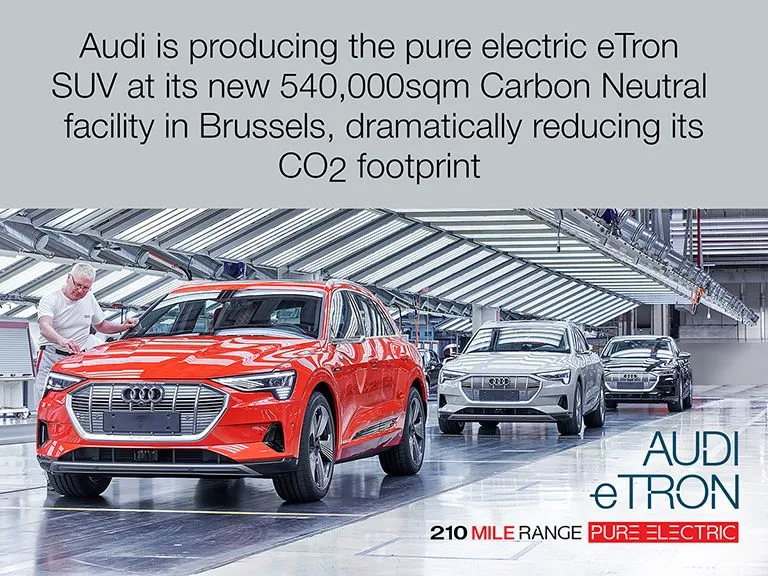
Audi is mass-producing e-Trons in a certifiably carbon neutral way
Ditching old gas-guzzling vehicles for new electric models will be key to reducing global CO2 emissions because electric vehicles are way more environmentally friendly. Or so a common argument goes.
By Daniel Cross / sustainability-times.com / April 8, 2019
Whereas it’s certainly true that EVs are preferable to vehicles with internal combustion engines, but they are not necessarily all that green either. If electric vehicles are powered by electricity obtained from the burning of fossil fuels, they aren’t emissions-free at all.
Then there’s the issues of how they are manufactured in the first place. If EVs are produced with plenty of CO2 emitted in the process by factories, emissions can be driven up considerably during mass production. According to several studies, including one published by the Union of Concerned Scientists, the manufacture of electric vehicles can even result in more CO2 emissions than that of conventional cars. The reason is that producing batteries and other parts for EVs is highly energy-intensive.
“Manufacturing a mid-sized EV with an 84-mile range results in about 15 percent more emissions than manufacturing an equivalent gasoline vehicle,” the Union of Concerned Scientists notes. “For larger, longer-range EVs that travel more than 250 miles per charge, the manufacturing emissions can be as much as 68 percent higher.”
Manufacturers are well aware of this, of course, and several of them have started revamping their production methods so as to reduce their carbon footprints. For one, last September the German carmaker Audi, which is a subsidiary of the Volkswagen conglomerate, opened a factory in Brussels to mass-produce its brand-new eTron line of electric SUVs in a certifiably carbon-neutral manner. The first new cars made that way are now rolling off the production line at the company’s sprawling 540,000sqm facility.
“The answer was obvious: Minimize the energy consumed and use different types of energy production to begin with,” says Patrick Danau, the plant’s director of production, technology, and logistics.
As part of that minimization effort, the manufacturer has set up 37,000sqm’s worth of photovoltaic cells on rooftop whereby it harvests 3,000 megawatt-hours of electricity annually from sunrays. “This saves the complex 700 metric tons of CO2 — equal to the yearly energy use of about 85 homes,” Wired magazine explains.
“The solar cells, which nearly blanket the facility’s multiple structures, reduce the plant’s total grid-based electricity consumption by 95 percent,” Wired adds. “The factory also puts a dent in its electricity consumption by using high-efficiency heat exchangers to control the temperature of different areas in the factory, which Audi estimates saves it another 4,000 tons of CO2 emissions annually.”
In addition, Audi manufactures batteries alongside vehicles so as to obviate the need for transporting batteries from long distances, which too results in plenty of carbon savings.
Reducing its carbon footprint at the facility has come at a financial cost, but it will be worth it in the long term, stresses Bram Schot, the company’s CEO. “It’s an investment, but if you look at it from a five- or 10-year perspective, it becomes a viable solution,” Schot says. “It’s also a matter of conviction — do you want to do that, yes or no?”
Daniel Cross / sustainability-times.com / April 8, 2019
https://www.sustainability-times.com/sustainable-business/a-carmaker-is-now-mass-producing-evs-in-a-carbon-neutral-way/
Recent Posts
- The 2022 Audi Q4 e-Tron SUV combines performance, practicality and luxury
- Ford's 2022 F150 Lightning All-Electric Truck is in high demand
- Legendary Audi performance is at the heart of the 2022 Audi e-tron GT and its RS sibling.
- Meet the Lexus RZ 450e – the luxury brand’s 1st EV
- The 2022 GV60 is Genesis’ first all-electric vehicle

